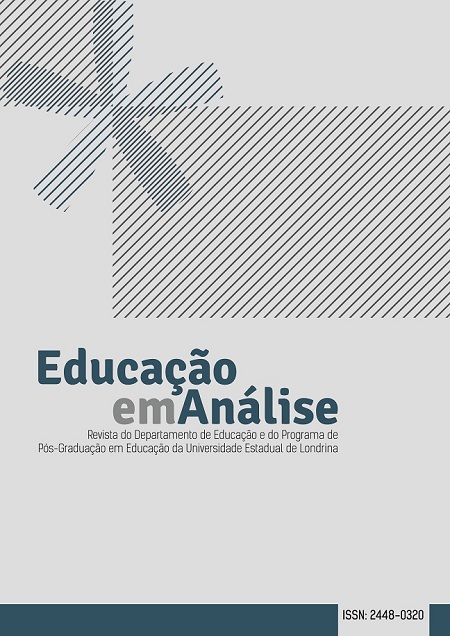Correlational study between executive function and school performance
DOI:
https://doi.org/10.5433/1984-7939.2017v2n1p83Keywords:
Executive functions, Planning, School performance, EvaluationAbstract
Executive functions are a set of cognitive and metacognitive processes that exert control and regulate behavior before context requirements. The study of executive functions is organized in skills that direct behavior as well as the planning skills. Planning consists of the ability to establish the best way to achieve a proposed goal, taking into consideration the route and use of essential tools for achieving a goal. The study aimed to investigate the relationship between the planning process and the academic performance of students of Elementary School. Participants were 142 students from public schools in Brazil, aged between eight and nine years old, of both sexes (79 boys, 55.6%). The instrument used was the test Torre de Londres (2012). The evaluation of school performance considered the concepts given by teachers to students in the eight disciplines of an academic quarter. For the analysis of the data, Pearson's correlation and discussions were considered, and the survey of literature for discussions. The main results indicate that there was a positive and significant correlation between cognitive ability of planning and performance in the subjects Mathematics, Arts and Literature. Whereas the development of executive functions can relate to learning school subjects, we suggest that intentional interventions are carried out in schools for the development of cognitive skills and better school performance of students.Downloads
References
BLAIR, C.; RAZZA, R. P. Relacionando o controle esforçado, a função executiva e a crença falsa entendendo a capacidade emergente de matemática e alfabetização no jardim de infância. Child Development, Chicago, v. 78, n. 2, p. 647-663, 2007. Disponível em: https://www.ncbi.nlm.nih.gov/pubmed/17381795. Acesso em: 10 set. 2017.
BULL, R.; ESPY, K. A.; WIEBE, S. A. Short-term memory, working memory, and executive functioning in preschoolers: longitudinal predictors of mathermatical achievement at age 7 years. Developmental Neuropsychology, Hillsdale, v. 33, n. 3, p. 205-228, 2008. Disponível em: http://www.ncbi.nlm.nih.gov/pmc/articles/PMC2729141/. Acesso em: 23 out. 2016.
DUNCAN, G. J. et al. Preparação escolar e posterior realização. Developmental Psychology, Washington, v. 43, n. 6, p. 1428-1446, Nov. 2007. Disponível em: https://www.ncbi.nlm.nih.gov/pubmed/18020822. Acesso em: 18 jul. 2017.
ESTEBAN, M. T. Exigências democráticas/exigências pedagógicas: avaliação. Tecnologia Educacional, Rio de Janeiro, v. 148, p. 3-6, 2000.
GAZZANIGA, M. S.; IVRY. R. B.; MANGUM, G. R. Neurociência cognitiva: a biologia da mente. Porto Alegre: Artmed, 2006.
KLAHR, D.; ROBINSON, M. Formal assessment of problem-solving and planning processes in preschool children. Cognitive Psychology, New York, v. 13, n. 1, p. 113-148, Jan. 1981. Disponível em: http://psycnet.apa.org/record/1981- 07682-001. Acesso em: 12 set. 20117.
LEON, C. B. R. et al. Funções executivas e desempenho escolar em crianças de 6 a 9 anos de idade. Revista de Psicopedagogia, São Paulo, v. 30, n. 92, 2013. Disponível em: http://pepsic.bvsalud.org/scielo.php?pid=S01034862013000200005&script=sci _arttext. Acesso em: 20 maio 2016.
LIMA, R. F.; TRAVAINI, P. P.; CIASCA, S. M. Amostra de desempenho de estudantes do ensino fundamental em testes de atenção e funções executivas. Revista Psicopedagogia, São Paulo, v. 26, n. 80, p. 188-99, 2009. Disponível em: http://www.revistapsicopedagogia.com.br/80/file_80/edicao80.pdf. Acesso em: 8 mar. 2015.
MIYAKE, A. et al. The Unity and diversity of executive functions and their contributions to complex "frontal lobe" tasks: a latend variable analysis. Cognitive Psychology, New York, n. 41, p. 49-100, 2000. Disponível em: http://citeseerx.ist.psu.edu/viewdoc/download?doi=10.1.1.485.1953&rep=rep1 &type=pdf. Acesso em: 24 jul. 2017.
MOURÃO JÚNIOR, C.; MELO, L. Integração de três conceitos: função executiva, memória de trabalho e aprendizado. Psicologia: Teoria e Pesquisa, Brasília, v. 27, n. 3, p. 309-314, 2011. Disponível em: http://www.scielo.br/pdf/ptp/v27n3/06.pdf. Acesso em: 26 abr. 2015.
PHILIPS, L. H. et al. Mental planning and the Tower of London task. The Quarterly Journal of Experimental Psychology, Aberdeen, v. 54, n. 2, p. 579-597, 2001. Disponível em: http://homepages.abdn.ac.uk/louise.phillips/pages/dept/research%20bits/agi ng_website_files/papers/TOL%20plan.pdf. Acesso em: 18 mar. 2015.
SEABRA, A. G. et al. Teste da Torre de Londres. In: SEABRA, A. G.; DIAS, N. M. (Org.). Avaliação neuropsicológica cognitiva: atenção e funções executivas. São Paulo: Memnon, 2012.
SULLIVAN, J.; RICCIO, C. A.; CASTILLO, C. R. Concurrent validity of the Tower Tasks as Measure of Executive Function in Adults: a meta-Analysis. Applied Neuropsychology, Mahwah, v. 16, n. 1, p. 62-75, 2009. Disponível em: http://www.researchgate.net/publication/23996632_Concurrent_validity_of_the _tower_tasks_as_measures_of_executive_function_in_adults_a_meta-analysis>. Acesso em: 12 fev. 2015.
VASCONCELOS, L. Neuropsicologia da atividade matemática: aspectos funcionais. In: SIPEMAT, 2006, Recife. Anais... Recife: Universidade Federal de Pernambuco, 2006. Disponível em: http://www.lematec.net.br/CDS/SIPEMAT06/artigos/vasconcelos.pdf. Acesso em: 5 set. 2017.
Downloads
Published
How to Cite
Issue
Section
License
Copyright (c) 2017 Educação em Análise

This work is licensed under a Creative Commons Attribution 4.0 International License.
Os artigos publicados na Revista Educação em Análise estão sob a Licença Creative Commons Atribuição 4.0 Internacional, garantindo Acesso Aberto. Deste modo, os autores mantêm os direitos autorais de seus trabalhos e, em caso de republicação, solicita-se que indiquem a primeira publicação nesta revista. Essa licença permite que qualquer pessoa leia, baixe, copie e compartilhe o conteúdo, desde que a devida citação seja feita. Além disso, autoriza a redistribuição, adaptação e criação de obras derivadas em qualquer formato ou meio, incluindo uso comercial, desde que a atribuição à revista seja mantida.
A revista se reserva o direito de efetuar, nos originais, alterações de ordem normativa, ortográfica e gramatical, com vistas a manter o padrão culto da língua e a credibilidade do veículo. Respeitará, no entanto, o estilo de escrever dos autores. Alterações, correções ou sugestões de ordem conceitual serão encaminhadas aos autores, quando necessário.
As opiniões emitidas pelos autores dos artigos são de sua exclusiva responsabilidade.
























